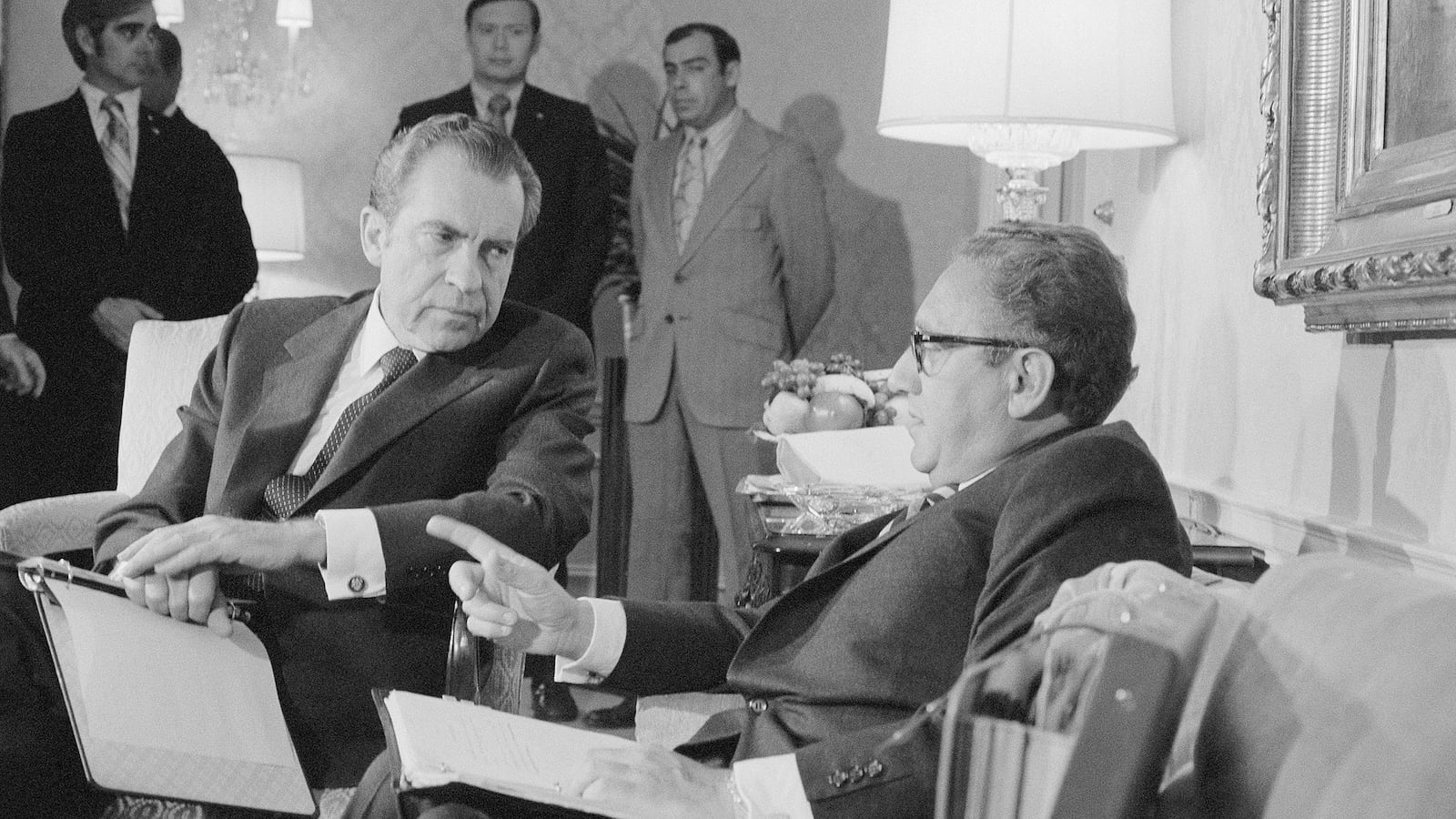I’ve only seen Henry Kissinger up close and personal twice. One time was an abortive interview about the U.S. wars in Indochina which ended with him stomping off.

The other time was during the early 2000s on a Manhattan street when I watched him and a body guard-type flee from protesters who were yelling epithets like “war criminal” and shouting “you’ve got blood on your hands, Henry.” They were no doubt referring to Kissinger’s connections to the killing of innocents in Vietnam. Or maybe it was Cambodia. Or possibly Laos. Or perhaps Chile. Or it could have been East Timor.
Gary Bass, a professor of politics and international affairs at Princeton University and a former reporter for The Economist, wants to make certain that Bangladesh is added to the list.
As national security advisor from 1969-1975 and Secretary of State from 1973-1977 under presidents Richard Nixon and Gerald Ford, Henry Kissinger was involved, as the late Christopher Hitchens ably documented, in a host of “offenses that might or should form the basis of a legal prosecution” in all of those aforementioned places. But that was hardly the full extent of it. “Nixon and Kissinger bear responsibility for a substantial complicity in the slaughter of Bengalis,” Bass writes in the opening pages of his latest book. “This overlooked episode deserves to be a defining part of their historical reputations.”
What Hitchens discusses in thumbnail form in 2001’s The Trial of Henry Kissinger, Bass tells in sharp detail in The Blood Telegram. Mining largely-ignored White House recordings of Nixon and Kissinger at their most unguarded as well as neglected U.S. and Indian archives and combining that material with extensive interviews with officials in India and the United States, Bass has written the definitive account of the political machinations behind one of the worst (and most widely ignored) humanitarian crises of the 20th century. Piecing together the sordid history of U.S. support for a Pakistani dictator who—according to CIA estimates—slaughtered of hundreds of thousands of civilians, Bass also offers Americans much-needed context about America’s pre-9/11 involvement in a region where it still finds itself with bloody hands and abysmal bedfellows.

Bass takes the title of his book from a communiqué sent by Archer Blood, the improbably named U.S. consul general in Dacca (in what was then Eastern Pakistan) who bucked the Nixon administration’s support for Pakistan’s fiercely anti-communist Muslim military ruler in the face of his 1971 mass murder of mostly Hindu Bengalis who were seeking political autonomy and, ultimately, their own independent nation. Blood’s back-channel, dissent telegram, written by a subordinate, was as blunt as it was damning:
Our government has failed to denounce the suppression of democracy. Our government has failed to denounce atrocities. Our government has failed to take forceful measures to protect its citizens while at the same time bending over backwards to placate the West Pak[istan] dominated government and to lessen likely and deservedly negative international public relations impact against them... We, as professional public servants express our dissent with current policy and fervently hope that our true and lasting interests here can be defined and our policies redirected in order to salvage our nation’s position as a moral leader of the free world.
For his principled stand, Blood—a longtime civil servant not normally given to such activist behavior—earned the opprobrium of Nixon and Kissinger, was sacked for his “rebellion,” and saw his promising career derailed. Meanwhile, the president and his national security advisor made sure that, despite a long-standing arms embargo (and against the wishes of the State Department), weapons, ammunition, and other military supplies kept flowing to Pakistan. Presaging the Iran-Contra affair, they followed this up by arranging for illegal transfers of advanced fighter aircraft through third countries like Iran and Jordan, crimes which have rarely garnered much attention. These episodes are expertly told and provide context for often forgotten Nixonian crimes and “Watergate” misconduct unconnected with the break-in at the Democratic National Committee headquarters: the secret bombing of Cambodia, the extensive sabotage and spying operations against political opponents, the wiretaps of government employees, and the illegal effort to silence Pentagon Papers’ whistleblower Daniel Ellsberg, to name a few.
Delving deep into the details of international diplomacy, Bass reveals the many political calculations of the United States, Soviet Union, China, and, especially, India regarding the crisis in Bangladesh and the latter nation’s resulting war with Pakistan. Through Western and Indian witnesses, we also come to understand the scale of the civilian suffering—mass shootings, rapes, village burnings, and a refugee crisis of almost unimaginable proportions. It’s a shame, however, that Bass largely focuses on an Oval Office-level view of the catastrophes and didn’t seek out survivors of the carnage to tell their stories and drive home exactly what U.S. weapons in the hands of Pakistani allies meant for ordinary Bengalis. Journalists and diplomats are often excellent chroniclers, but their reports can lack the punch of the testimony of those who themselves were beaten, bloodied, had their homes burnt, and lives wrecked.
Regardless, The Blood Telegram offers a nuanced yet unflinching look at the juxtaposition of geopolitics and humanitarian crisis. Bass shines a much-needed spotlight on yet another dark corner of modern American history, revealing yet another bloody episode stemming from Kissinger’s crass calculations and Nixon’s embrace of brutal dictators. He even offers a window onto a fascinating and truly frightening episode of apparent role reversal in which Kissinger (who long claimed he regularly restrained his “madman” boss) was braying for war—advocating the U.S. throw its military might behind China in a potential conflict with India and the Soviet Union, risking an all-out nuclear war—while Nixon tried to ratchet down the rhetoric and act as the voice of reason.
“Nixon and Kissinger largely failed at sanitizing their record on Watergate, Vietnam, and Cambodia -- but on Bangladesh they proved to be remarkably deft at ducking public judgment,” Bass writes. The Blood Telegram should definitively put an end to this and provide more ammunition to those who might have a bone to pick with Henry Kissinger on a Manhattan street.






